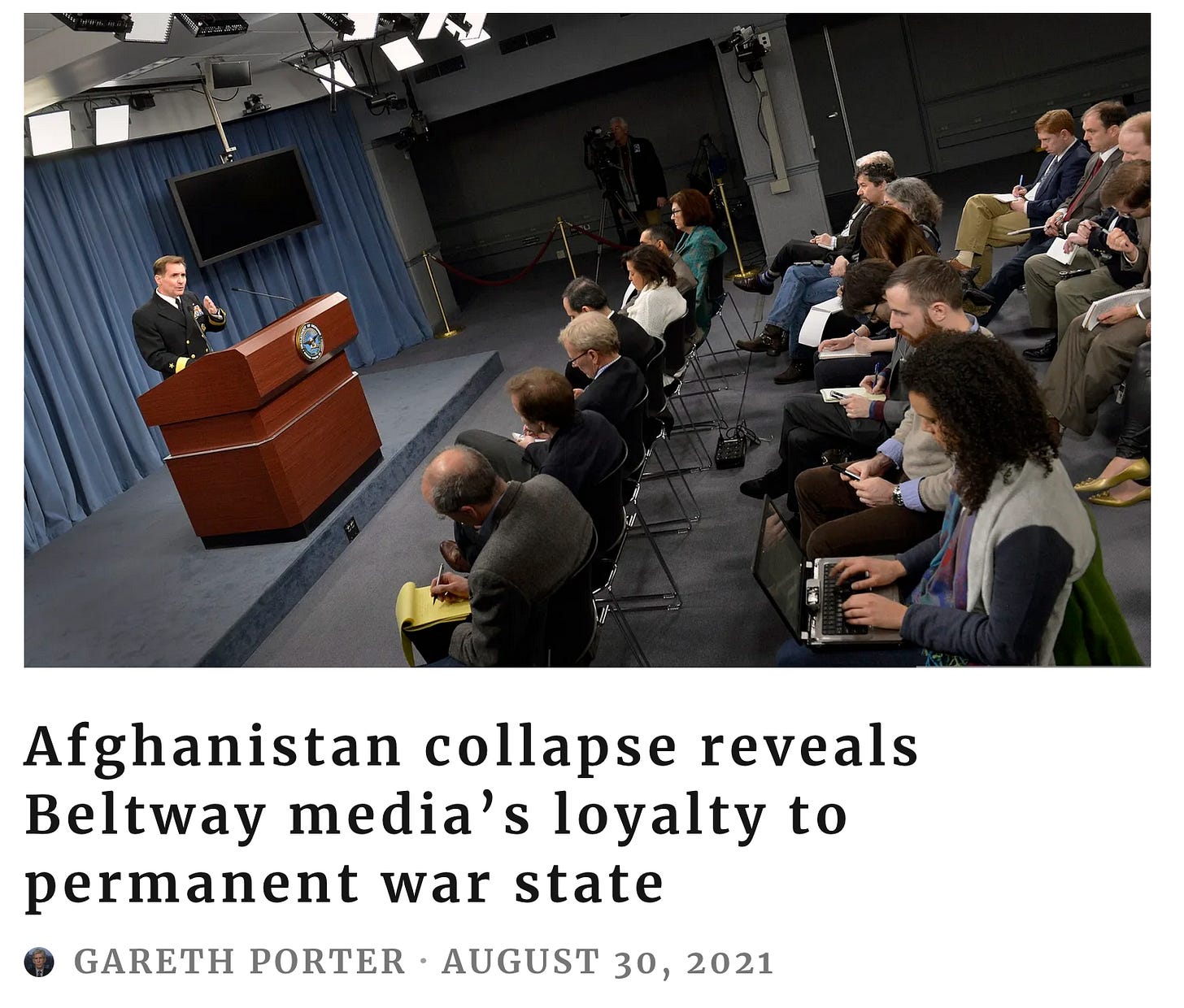Why the press wanted permanent war in Afghanistan - #22
Corporate media is part of the military-industrial complex.
This in The Grayzone is one of the best articles I’ve read recently about the US defeat in Afghanistan. In it Gareth Porter explains how and why the US press corps have largely echoed the agenda of the US security state on Afghanistan.
There is a revolving door between the corporate press, the Washington DC think tank elite, top government advisers and the military-industrial complex, especially the arms industry. Within this nexus of interests, there is a consensus that the US (and by implication its British lackey) should have stayed in Afghanistan forever — in firm opposition to the wishes of the vast majority of people.
Some extracts:
In a revealing interview with the Post’s Jaffe, the former Pentagon official blamed the failure of the U.S. war in Afghanistan on an excessive commitment to “democratic ideals,” …
But the problem was not an excessive U.S. concern for promoting democracy, but the way that U.S. policy sold out “democratic ideals” to support a group of warlords who represented the essence of anti-democratic despotism …
The Taliban easily ousted the U.S.-supported regime from large parts of Afghanistan’s Helmand province beginning in 2005-06 because of the local population’s hatred of the lawless warlord militias designated by the U.S. military as police
A lot of what Porter writes about the US corporate press on this issue applies equally to the British press. Read the whole article here.
My Electronic Intifada colleague David Cronin wrote this important recent article about the European Union’s support for Israel’s puppet Palestinian Authority regime and its violence and abuses against Palestinians.
While the EU makes lots of pious noise about the PA and its terrible human rights record, in fact:
Throughout the PA’s history, the European Union has been its largest donor. The EU’s direct budgetary assistance to the authority was worth approximately $187 million in 2020.
A staggering amount. The role of the Palestinian Authority since its inception in 1993 has been to collaborate with the Israeli occupation. That’s what it was intended to do all along. It has fulfilled this role quite successfully, and it habitually uses violence and torture to do so.
The EU’s declarations about “human rights” and the PA are therefore ridiculous:
In this week’s statement, the European envoys say they “firmly expect” the PA to meet its commitments on human rights.
Who do these guys think they are kidding?
Finally this week, please do read this piece by Hamza Abu Eltarabesh, a Palestinian journalist in Gaza, and a survivor of Israel’s most recent wars there. He relates the story of Khaled, a newspaper colleague who lost his brother to Israeli attacks in 2014. He was naturally devastated, but:
Once the burial had taken place, we left Khaled and his family and returned to the al-Resala [newspaper] offices. It felt like there was a negative energy in the whole building.
Two hours later, the doors burst open. Khaled marched in and shouted: “We have to honor our martyrs’ blood. Keep working. If you stop working, you are traitors to the cause.”
My work this week
In the latest episode of The Electronic Intifada Podcast, Nora and I talked to Huda and Richard, the founders of Palestine Action. The group was founded just over a year ago, to embark on a sustained campaigns of direct action against Israeli arms makers Elbit.
Huda and Richard reflect on their first year of campaigning against Elbit, which makes most of Israel’s drones, and talk about the future.
Watch the discussion in the YouTube video above, or you can listen to it here.
In my latest Middle East Monitor column, from the weekend, I discussed the context of Israeli Prime Minister Naftali Bennett’s trip to Washington DC to meet with US President Joe Biden.
I wrote another subscriber-only post for this Substack. For it, I did a re-watch of Inside Britain’s Israel Lobby, an important 2009 episode of Dispatches. In the piece I talk to the film’s maker, Peter Oborne, who tells me he thinks the film could not be made in the Britain of 2021, explaining his reasons why.
Please do sign up as a paid subscriber so that you can read the piece.
Tweets of the Week

And an example of what Matt is talking about is Jennie Formby:








